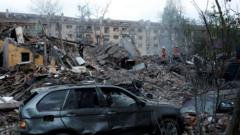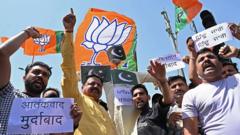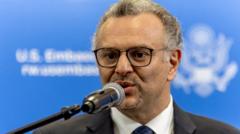Ukrainian President Volodymyr Zelensky's diplomatic efforts in South Africa were interrupted by a significant Russian offensive, leading to his immediate return to Kyiv.
### Zelensky Abruptly Ends South Africa Visit Following Kyiv Strike

### Zelensky Abruptly Ends South Africa Visit Following Kyiv Strike
President Zelensky cuts visit short after deadly missile attack in Ukraine
In a surprising turn of events, Ukrainian President Volodymyr Zelensky has had to truncate his visit to South Africa due to a severe missile and drone assault on the capital, Kyiv. This assault resulted in at least nine fatalities and over 70 injuries, including among children, as reported by local authorities. Following his meeting with South African President Cyril Ramaphosa, Zelensky announced via his social media platform, X, that he would be returning to Ukraine "immediately," citing ongoing rescue operations and significant destruction caused by the attacks.
The backdrop to this development included a ceasefire agreement proposed by the United States, which has been in effect for 44 days. However, Zelensky's refusal to accept Russian control over Crimea has drawn criticism from U.S. officials, including former President Donald Trump. Trump indicated that Zelensky's stance could jeopardize ongoing peace negotiations, claiming a potential deal to conclude the conflict was "very close." Conversations from U.S. leadership, including Vice-President JD Vance, revolved around a vision for a settlement that would involve territorial compromises from both Ukraine and Russia, without clarifying specific territorial adjustments.
Zelensky's firm position against recognizing Russia's annexation of Crimea highlights a significant geopolitical dilemma, as yielding to Russian demands would contradict long-held principles against territorial alterations through military force. The complexities of the situation underscore the ongoing challenges in achieving a sustainable resolution to the conflict while balancing international legal norms and local sentiments.
The backdrop to this development included a ceasefire agreement proposed by the United States, which has been in effect for 44 days. However, Zelensky's refusal to accept Russian control over Crimea has drawn criticism from U.S. officials, including former President Donald Trump. Trump indicated that Zelensky's stance could jeopardize ongoing peace negotiations, claiming a potential deal to conclude the conflict was "very close." Conversations from U.S. leadership, including Vice-President JD Vance, revolved around a vision for a settlement that would involve territorial compromises from both Ukraine and Russia, without clarifying specific territorial adjustments.
Zelensky's firm position against recognizing Russia's annexation of Crimea highlights a significant geopolitical dilemma, as yielding to Russian demands would contradict long-held principles against territorial alterations through military force. The complexities of the situation underscore the ongoing challenges in achieving a sustainable resolution to the conflict while balancing international legal norms and local sentiments.





















